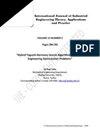Risk Level Assessment of Pipelines using a Combination of Analytical Network Process and Risk Based Inspection Methods
IF 1
4区 工程技术
Q4 ENGINEERING, INDUSTRIAL
International Journal of Industrial Engineering-Theory Applications and Practice
Pub Date : 2018-09-25
DOI:10.14445/23499362/ijie-v5i3p104
引用次数: 1
Abstract
Using pipelines is the most effective and efficient way to transport oil and gas to an intended destination. However, pipelines also pose risks to humans, the environment and business interests. This research study assessed the level of pipeline risk of PT X. As such, it aimed to identify the efficacy of inspection and maintenance planning using a priority scale based on the ranking of the causes of failure. A combination of Analytical Network Process (ANP) and Risk-based Inspection (RBI) methods was used to assess the risk level of pipeline failure. The results using the ANP method showed that corrosion (44.64%) is the main factor causing failure to the pipelines. The atmospheric corrosion subfactor is one of the corrosion factors that contributed to pipeline failure (16.12%). Safety is the most significant consequence of the impact of pipeline failure (51.54%). Furthermore, by applying the RBI method, the Probability of Failure (PoF) value was calculated to be 1.2028 and the Consequence of Failure (CoF) value was 4.290, resulting in a risk level of 4 on the risk matrix order of 6 x 6. Inspection and maintenance programmes should pay special attention to the corrosion factors and the atmospheric corrosion subfactors in order to reduce the risk level associated with pipeline failure.使用分析网络过程和基于风险的检查方法相结合的管道风险等级评估
使用管道是将石油和天然气运输到预定目的地的最有效和高效的方式。然而,管道也对人类、环境和商业利益构成风险。这项研究评估了PT X的管道风险水平。因此,它旨在使用基于故障原因排名的优先级量表来确定检查和维护计划的有效性。将分析网络过程(ANP)和基于风险的检查(RBI)方法相结合,用于评估管道故障的风险水平。ANP法的结果表明,腐蚀(44.64%)是导致管道失效的主要因素。大气腐蚀亚因素是导致管道失效的腐蚀因素之一(16.12%)。安全是管道失效影响的最显著后果(51.54%)。此外,通过应用RBI方法,计算出失效概率(PoF)值为1.2028,失效后果(CoF)为4.290,导致风险矩阵顺序为6 x 6的风险等级为4。检查和维护计划应特别注意腐蚀因素和大气腐蚀亚因素,以降低与管道故障相关的风险水平。
本文章由计算机程序翻译,如有差异,请以英文原文为准。
求助全文
约1分钟内获得全文
求助全文
来源期刊

International Journal of Industrial Engineering-Theory Applications and Practice
Engineering-Industrial and Manufacturing Engineering
CiteScore
1.30
自引率
45.50%
发文量
31
期刊介绍:
The journal emphasizes use of engineering design and analysis and strives to maintain a balance between research and application. The journal covers all aspects of industrial engineering, particularly: Data mining and Computational Intelligence; Production Planning and Control; Operation Research; Service Engineering (Healthcare, etc.); Sustainability (Energy, Environment, etc.); Information Systems and Technology; Management of Technology; Manufacturing; Work Measurement, Human Factors and Ergonomics; Quality, Reliability, Maintenance Engineering; Supply Chain Management; Logistics and Material Handling; Product Design and Development; Statistical Analysis; Modelling and Simulation; Homeland Security (Defense, Disaster Preparedeness, etc.)
 求助内容:
求助内容: 应助结果提醒方式:
应助结果提醒方式:


